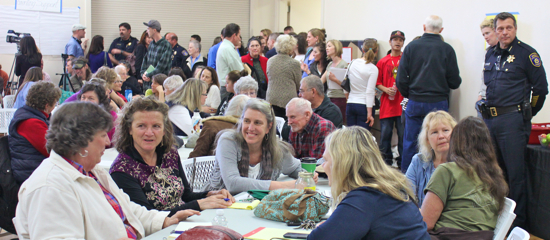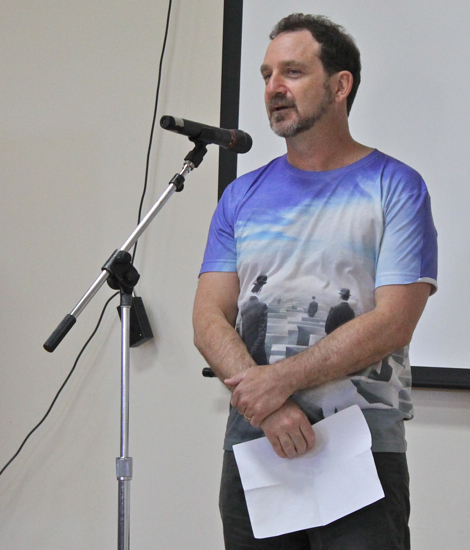
As I drove to Redwood Acres for last Thursday’s Humboldt County Meth Awareness Project meeting, I wasn’t sure what to expect. I knew a large crowd would be there — the meeting location had wisely been switched to a larger venue in advance due to growing online support. Once parked, I followed a diverse group inside — young hipsters and white hairs, those who looked to have just rolled out of bed and those in uniforms, mothers with kids and some who came alone. I made my way into the standing room only room and found a spot against the wall.
With hundreds of hopeful community members looking on, Dr. Michael Fratkin, a physician at St. Joseph’s hospital in Eureka who specializes in palliative care, stepped forward to the microphone, took a deep breath.
“I am falling in love with my community again today,” he said.
It was during Fratkin’s opening remarks I was reminded how powerful a story can be. He didn’t cite a dozen statistics. He didn’t tell us of how many meth labs are in this county or how many infants are born pos-tox. Instead, he shared the story of a woman named Tricia. She was addicted to meth, struggling with diabetes, and often found herself in a hospital bed four to five times a month for over a year. Dr. Fratkin shared that Tricia was a patient on his rounds. Through their numerous encounters, he found himself drawn to her and found love for her despite her difficult attitude.
 During one of Tricia’s visits, this time in the ICU, another doctor took a picture of her, capturing her horrific appearance, broken teeth, meth-pocked skin and all. A few days later, Dr. Fratkin showed Tricia this photograph. She would later tell Dr. Fratkin how much the photo effected her. That image, in addition to the persistent love and respect she received from her family and friends, helped pull her out of her darkness. Although her addictions and her diabetes have led to permanent health problems and loss of eyesight, Tricia is now two years sober.
During one of Tricia’s visits, this time in the ICU, another doctor took a picture of her, capturing her horrific appearance, broken teeth, meth-pocked skin and all. A few days later, Dr. Fratkin showed Tricia this photograph. She would later tell Dr. Fratkin how much the photo effected her. That image, in addition to the persistent love and respect she received from her family and friends, helped pull her out of her darkness. Although her addictions and her diabetes have led to permanent health problems and loss of eyesight, Tricia is now two years sober.
Dr. Fratkin’s story opened the room up. Those gathered shared about how meth and addiction had torn their families apart. Some said they were afraid to walk down the street. Others told stories of children in local elementary schools whose parents struggle with addictions.
Stories speak. They tell us more about life than statistics and facts ever can.
Being a foster parent in Humboldt County has provided me opportunities to witness first hand what meth does to a family. I’ve witnessed generational using where grandparents and parents struggling with meth addiction. I have seen the next generation writhe with discomfort in the hospital after birth — hearing them cry in a way other babies do not — going through the painful reality of detoxing as a newborn. I have held a baby born with bleeding on his brain after a stroke in utero because of his mother using meth.
So, yeah, this issue is kind of personal.
But I have also seen these families, after experiencing such loss as losing a child to the system, finding themselves loved through it all. I have found myself loving and caring for mothers who were held prisoner by addiction and I have seen them discover their self worth and that their addictions do not define them. They are valuable and loved and there is hope. There is always hope.
Sure, there are some toxic relationships which can be fixed, but maybe not by you. Sometimes love must be given from a distance for your own safety and protection, but other times you might be able to provide the exact kind of love and respect people need to help break the chains which have held them captive long enough.
As humans, our first reaction is to avoid pain, our own and others. Our desire is to flee from it, hide from it, ignore it. It’s hard to hurt and sometimes it’s even harder to be around people who are hurting.
I have witnessed first hand how love and respect can be the change a person needs. I have felt love and respect from others change me when I’m down. So, may you intentionally discover those around you who are hurting. May your eyes be opened to their pain and may your love and respect be the soothing, hopeful balm on their hurting soul. I’ll close with this:
“When we honestly ask ourselves which person in our lives mean the most to us, we often find that it is those who, instead of giving advice, solutions, or cures, have chosen rather to share our pain and touch our wounds with a warm and tender hand. The friend who can be silent with us in a moment of despair or confusion, who can stay with us in an hour of grief and bereavement, who can tolerate not knowing, not curing, not healing and face with us the reality of our powerlessness, that is a friend who cares.” – Henri Nouwen
[Bethany Cseh is co-pastor of Catalyst Church in Arcata.]
PREVIOUSLY in FAITH-Y:
CLICK TO MANAGE